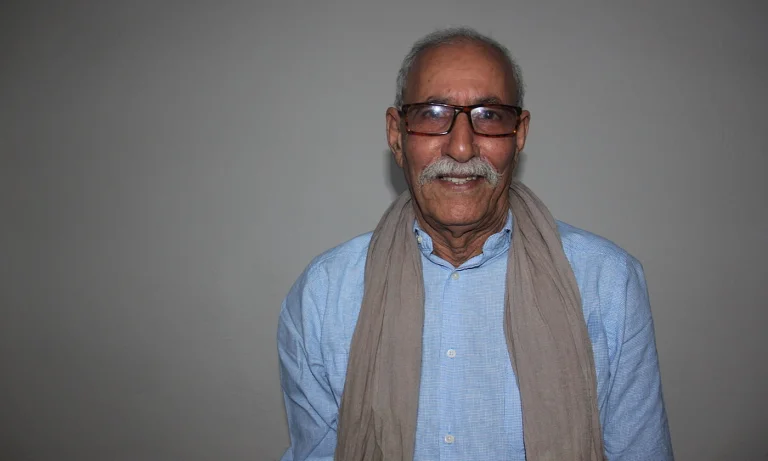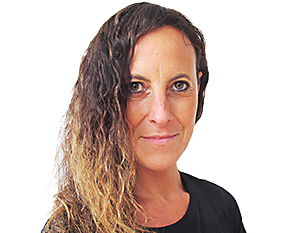07.05.2023 - 21:40
Brahim Gali (Smara, Western Sahara, 1949) must be the only president who lives in a refugee camp. The president of the Sahrawi Arab Democratic Republic lives in exile in Tindouf, Algeria. He lives in a modest and elegant adobe house. He is barefoot, sitting on the ground next to a small table with water, juice, tea, and dates. It is Ramadan, –Kristina Berasain, a journalist from Berria, interviewed him a month ago. He starts talking after the iftar, the breakfast that Muslims eat to break the fast after sunset. Occasionally, the call to prayer is heard from the mosque.
Gali’s life and the struggle of the Sahrawi people are parallel. They cannot be understood without each other. He was one of the founders of the Polisario Front, the first Secretary-General, and has worked both on the battlefield and in diplomacy. He has the reputation of a skilled and exceptional soldier. He was the military leader of the Battle of El-Khanga on May 20, 1973, the first armed action against Spanish colonialism.
Gali worked alongside historical leaders Mohamed Sidi Brahim Basiri and El-Uali Mustafa Saied in the national liberation movement. On October 22, 1975, Gali, El-Uali, and Mahfoud Ali Beiba met with the governor of Spanish Sahara, General Federico Gómez de Salazar, in the first official meeting between representatives of the Spanish government and the Sahrawis. Negotiations broke down when Spain imposed a repatriation order to Laayoune. Betrayal was imminent: “Morocco and Mauritania divided Western Sahara as if it were bread.”
He was the Minister of Defense, as well as the representative of the Polisario Front in Spain and Algeria. After the death of Mohamed Abdelaziz, he was re-elected Secretary-General in 2016, and was confirmed for the third time at the congress held last January. He is a representative of the old guard.
—There are several biographies written about you online. Among them, it can be read that you were a member of the Spanish nomadic troops. Was it true?
—I will not answer that question.
—You have been a direct witness to the trajectory of the national liberation movement, from its beginnings to the present day. The goal of its creation has not yet been achieved. How do you see the Polisario Front?
—It is a unique situation. At that time, we were only seventeen people. Today, we have an army, a complete army. The Polisario Front has achieved many things. First, before the invasion and the division of our land. Then we created a clandestine liberation movement and achieved national unity, which we celebrate every year. Thanks to this unity, many Sahrawis joined the Polisario Front. The second achievement was the proclamation of the SADR, one day after Spain abandoned the territory, on February 27, 1976. Today, 84 countries recognize us. The Sahrawi Arab Democratic Republic was one of the founding states of the African Union. And today we have diplomatic relations with many countries in Africa, Latin America, and Asia. We also have representation in most European countries. Unfortunately, until now, no European country has had the courage to recognize the SADR, despite its irreversible reality.
—You have created a state in exile…
—We have a state infrastructure. There is a presidency, a government, a parliament. We have a structure fully prepared to implement it in our territory after independence. In fact, to achieve this goal, the Polisario Front was created, and it continues to do so today, with the same determination, despite the difficulties and obstacles that we encounter along the way, but these do not affect our struggle. Each generation is more radical than the previous one, which ensures the continuation of the resistance. Our objectives are the independence of the territory and the establishment of a sovereign and independent Saharan state within internationally accepted borders.
—In November 2020, the war started again, after Morocco broke the ceasefire established in 1991. It is a silent war.
—This is not new, the boycott of the Saharan resistance. There is a complicit silence, not only in the face of war but also in the face of repression in the occupied territories, human rights violations, looting of natural resources, and in the face of the resistance of a people who have suffered so much and only demand what is theirs. They ignore it. We are not expansionist, but we want what is ours, we want our territory.
—The Polisario Front decided to increase armed struggle at the last congress. Can you explain how this decision was made?
—Today there is almost total mobilization in society, especially here in the camps and in the diaspora. All Sahrawis want to join the army. Militarily, we are trying to adapt to the new situation. Today’s war is not the war we have known in the past, and we are adapting to it until we create some kind of balance. In my understanding, there will come a time when the situation will be more comfortable than what we have experienced in the last two years. Persecutions against the enemy have increased. The enemy has suffered personal and material losses. It is a war of attrition, and this attrition is taking its toll on the morale and material resources of the Moroccan troops. Slowly, we will reach the summit and tip the balance on the battlefield.
—Morocco uses drones provided by Israel, Turkey, and France. The imbalance is very high.
—That is why we are trying to adapt to this new situation, to this type of war that requires other means, tactics, other ways, and strategies, and we are on this path.
—Since the start of this second war, it is said that around a hundred Sahrawis have died, both civilians and military, almost all as a result of drone attacks.
—These figures are not correct.
—Many nomadic families living in liberated territories have had to take refuge in camps, precisely because of the danger of drones…
—That’s right. Mostly women and children have come. Most of the men are nomads, and they stay in the territory with the animals. As for the deaths, they do not reach half of the number you mentioned. In our opponent, yes, there are losses, even if they are completely hidden. After each attack, they try to attract MINURSO to be a witness, with other intentions, of course, but they have losses.
—You mentioned MINURSO, the United Nations mission. The new UN representative for Western Sahara, Staphan de Mistura, refused to enter Western Sahara, due to the veto imposed by Morocco. All delegates have resigned so far, and negotiations are suspended. When it comes to this, what do you expect?
—The Sahrawi people are frustrated because they believed that the international community would fulfill the commitment it had given them at a certain point, but in addition to not fulfilling it, they have also been complicit with the aggressor and occupier. De Mistura faces obstacles in Morocco. I think he has good intentions, but he has not found enough support from the Security Council to pressure this state, country, or regime favored by the West. This cannot continue. The internal situation in Morocco is about to explode, and this is added to the economic, military, and moral erosion to which the Sahrawi people are subjected by the Moroccan regime. We hope that De Mistura has the support of the Security Council and is not under pressure, especially from the closest allies such as the US and France. Intransigence until when? And what are the medium and long-term consequences? I believe they are not assessing the danger of this situation of war and this social, political, and economic situation in Morocco itself.
—A year ago, Morocco published that letter, in which the Spanish President, Pedro Sánchez, said that he supported the autonomy of Western Sahara. In one of the interviews, you said that Spain should correct this statement. What do you think of this turnaround? What is behind it?
—We hope that the people of the Spanish State will be able to decipher this enigma. In my opinion, that turnaround is, after the betrayals of 75 and 76, the worst betrayal we have seen from Spanish governments. There must be something very serious, some secret, some blackmail, against the personality of the president himself or those around him. I cannot go any further, it is up to the Spaniards to discover the secret. It is the third betrayal of the Sahrawi people, and this was not what we expected from the Spanish authorities; Spain has a moral, legal, and political responsibility towards the Sahrawi people. It is not the way to be faithful to the common history and culture that unites us. Why that sudden turnaround? What are the reasons? This is the question we ask all the peoples of the Spanish State, for them to explain what that secret is. 47 years later, Spain stirs the same knife in the same wound, and this is painful, but nothing will change. It will not affect the resistance of the Sahrawi people, nor their willingness to continue fighting until they achieve their objectives.
—You say it is the third betrayal…
—Yes. After the tripartite agreement of Madrid, on November 14, 1975, and the abandonment of February 26, 1976. This country, for many years, has been a victim of an injustice, and unfortunately, the Spanish authorities are part of it. I do not know if they can correct and fix this injustice. I hope so. I believe that the position of the President of the Government, Pedro Sánchez, this turnaround, is personal, unilateral; there is no complete change of mind, neither within the government itself, nor in the congress, nor in the senate, nor in the parties, nor even in the peoples of the state. No one supports him in this attitude, but I hope that civil society and political forces can exert influence and pressure to correct this attitude and the injustice that has been repeated too many times.



